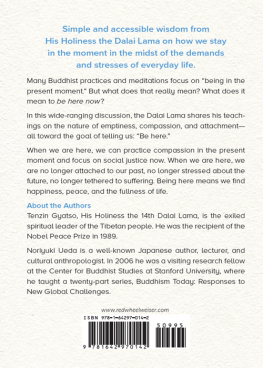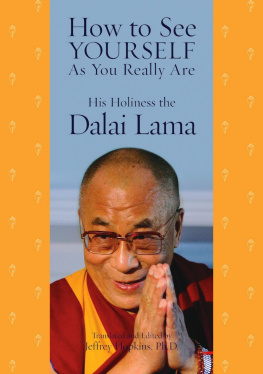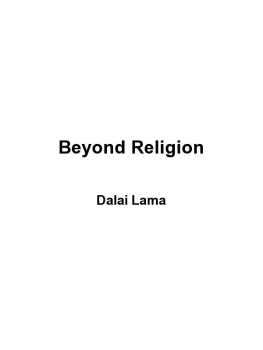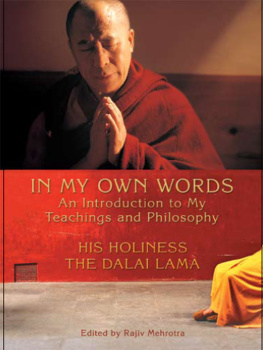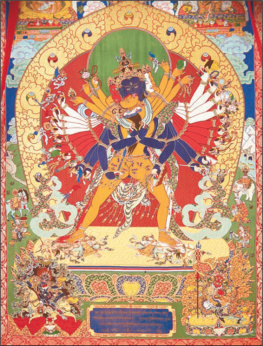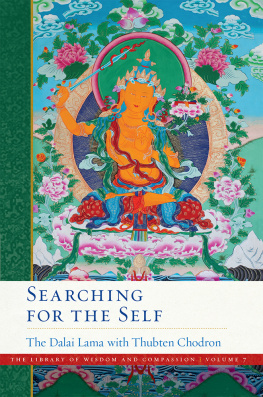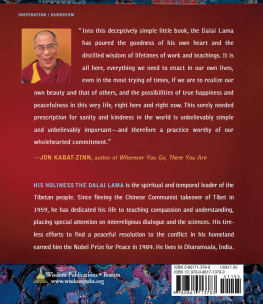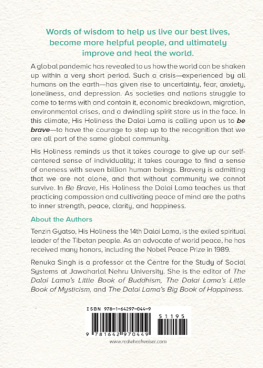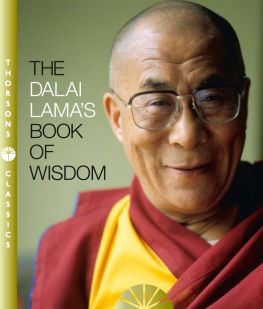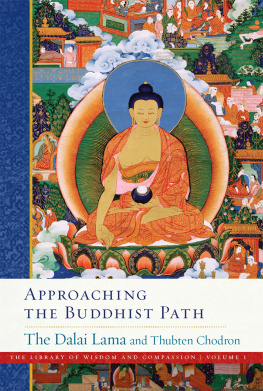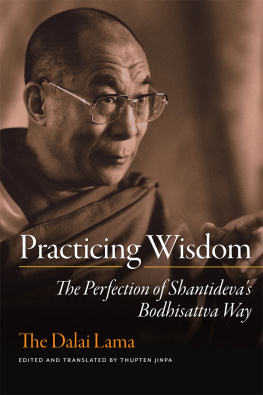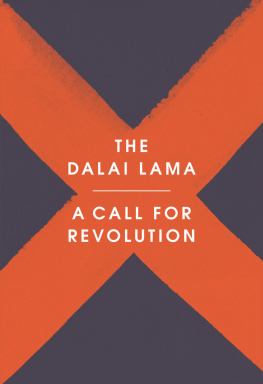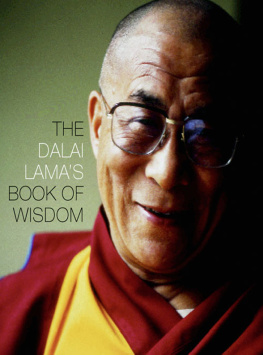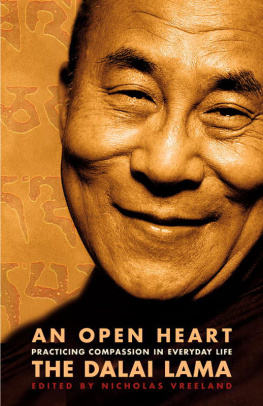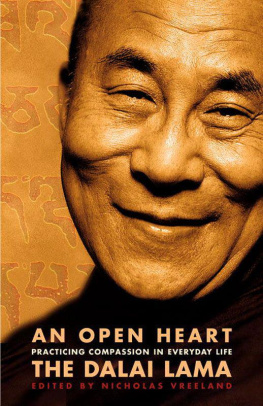

Copyright 2019 Noriyuki Ueda
All rights reserved. No part of this publication may be reproduced or transmitted in any form or by any means, electronic or mechanical, including photocopying, recording, or by any information storage and retrieval system, without permission in writing from Hampton Roads Publishing, Inc.
Reviewers may quote brief passages.
Portrait of the Dalai Lama created by vectorportal.com
Hampton Roads Publishing Company, Inc.
Charlottesville, VA 22906
Distributed by Red Wheel/Weiser, LLC
www.redwheelweiser.com
Sign up for our newsletter and special offers by going to
www.redwheelweiser.com/newsletter.
ISBN: 978-1-64297-014-2
Library of Congress Control
Number available upon request
Printed in the United States of America
BP
10 9 8 7 6 5 4 3 2 1

Contents
Publisher's note:
Attachment. Emptiness. Compassion. Existence. You will hear these words again and again in the teachings of the Dalai Lama presented in this book of wisdom.
Many buddhist practices and meditations focus on being in the present moment. But what does that really mean? What does it mean to be here now?
The Dalai Lama speaks of attachmentto things, to people, to memory, to feelings of anger and resentment, to future goals. Being attached means we are not here now; rather, we are living through wherever our attachment takes us.
Emptiness. Does that mean we let go of everyting? Even the present thoughts in our minds? How does understanding emptiness help us to be here now?
The Dalai Lama is clear: if we are not educated about past history and if we have no sense of the future, then how can we possibly have a present?
In this wide-ranging discussion, the Dalai Lama talks about the nature of emptiness, compassion, and attachmentall toward the goal of telling us:
Be here.
When we are here, we can practice compassion in the present moment and focus on social jusice now. When we are here, we are no longer attached to our past, no longer stressed about the future, no longer tethered to suffering.
Being here means we find happiness, peace, and the fullness of life.

T his book was compiled from an interview with the Dalai Lama conducted by Noriyuki Ueda, a well-known Japanese author, lecturer, and cultural anthropologist. As a visiting research fellow at the Center for Buddhist Studies at Stanford University, he taught a twenty-part lecture series on contemporary Buddhism during which his students questioned him: Can buddhism respond to contemporary problems?
His interview with the Dalai Lama provides insight into the answer.
BE HERE
T he time when only monks decide how we should practice Buddhism is over. People from all walks of lifeeducators, scientists, administratorsshould come together to discuss the revival of Buddhism in our modern time.
The Buddha's teachings have two levels, wisdom and expedient meansor, in other words, the understanding of truth and practical action in the here and now.
Wisdom is the knowledge of causality, or emptiness; expedient refers to nonviolent action, or the practice of compassion.
What is emptiness? It is the view that all phenomena must be understood as mutually interdependent. This idea forms the core of Nagarjuna's teaching of the middle way. Nothing arises without a cause.
This is in contrast to the Christian belief in a divine creator of all things. In Buddhism we grasp that all things are produced through cause and effect. Happiness, suffering, and all phenomena arise due to specific causes. All things are born not of themselves but from their causes.
Causality refers to all things being interdependent. Emptiness is not nothingness; it means that all things exist within causality. All things are empty of self-nature; they do not exist on their own, but are mutually interdependent.
THE BUDDHA'S TEACHINGS HAVE TWO LEVELSTHE UNDERSTANDING OF TRUTH AND PRACTICAL ACTION IN THE HERE AND NOW.
In Buddhism, both the wisdom of emptiness and the practice of compassion are important. Compassion and kindness are the essence of Buddhism.
Emptiness and Compassion
What is the connection between emptiness and compassion? Some Buddhist monks understand and expound the doctrine of emptiness, yet clearly lack compassion toward suffering sentient beings. In this case, there may be understanding of truth but no practical action.
If a person truly understands emptiness, then compassion naturally arises, and if it does not, then his understanding of emptiness may be flawed.
Emptiness means that all things are interdependent, yet it is often misinterpreted as nothingness. If we develop our understanding of emptiness, then compassion naturally arises because all things are interdependent and interconnected in causality.
IF A PERSON TRULY UNDERSTANDS EMPTINESS, THEN COMPASSION NATURALLY ARISES.
Yet how is it that compassion naturally arises? I think this matter conceals a very delicate problem.
Regarding the understanding of emptiness, there are four philosophical schools: the Sarvstivda, Sautrntika, Yogcra, and Madhyamaka. The first two are Hnayna philosophies, and the latter two are independent Mahyna philosophies; those who study Mahyna Buddhism must study all four. The fourth, the Madhyamaka, is further divided into the Svtantrika and Prsangika schools.
To understand profound emptiness, we must grasp the subtle difference among the views of no-self that is emphasized in the Yogcra, Svtantrika, and Prsangika schools. The most profound and highest emptiness, according to the Prsangika school, is the interpretation that all things exist depending on causes and conditions.
In other words, nothing exists on its own, but rather, existence is understood in such a way that all things arise dependent on causes and conditions. In this view of causality, all things are dependent on other things, and through causality we can perceive reality.
Emptiness is understood as causality. When we see that emptiness is based on causality, then emptiness does not signify a void in which nothing tangible exists, but rather that all things arise in this world according to cause and effect.
ALL THINGS EXIST DEPENDING ON CAUSES AND CONDITIONS.
ALL THINGS ARE DEPENDENT ON OTHER THINGS.
THROUGH CAUSALITY WE PERCEIVE REALITY.
My first point is this understanding of emptiness based on causality, in which nothing possesses self-nature. But the mind of compassion does not arise from this understanding alone.
My second point is that once we know the meaning of emptiness based on causality, we are able to see that the suffering of all living things is rooted in the mind of ignorance, and that it is possible to extinguish that ignorance.
Emptiness and ignorance are completely contrary to each other. The failure to understand emptiness and interdependence is ignorance, and as one strengthens one's conviction about emptiness, the mind of ignorance loses its power.
Through cultivating this awareness of emptiness, the ignorance that is the source of our confusion and suffering can be extinguished.
Next page
